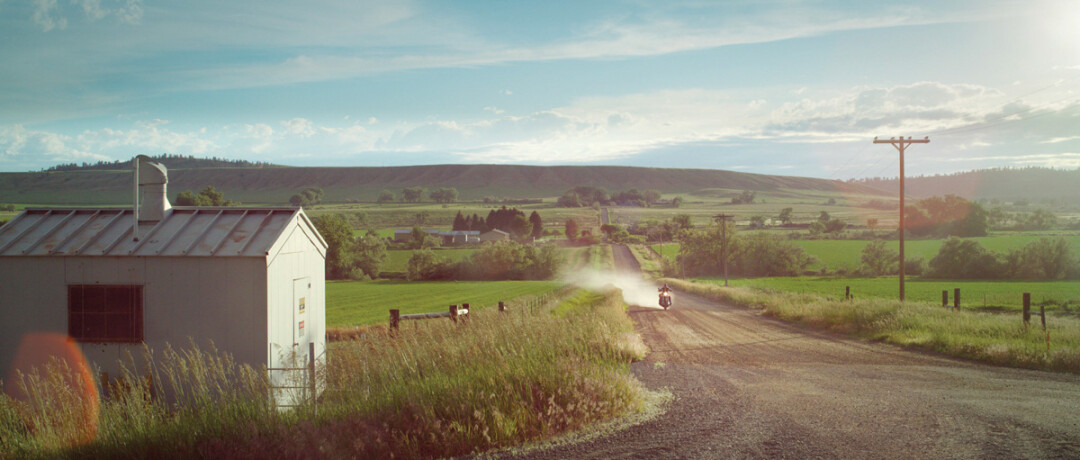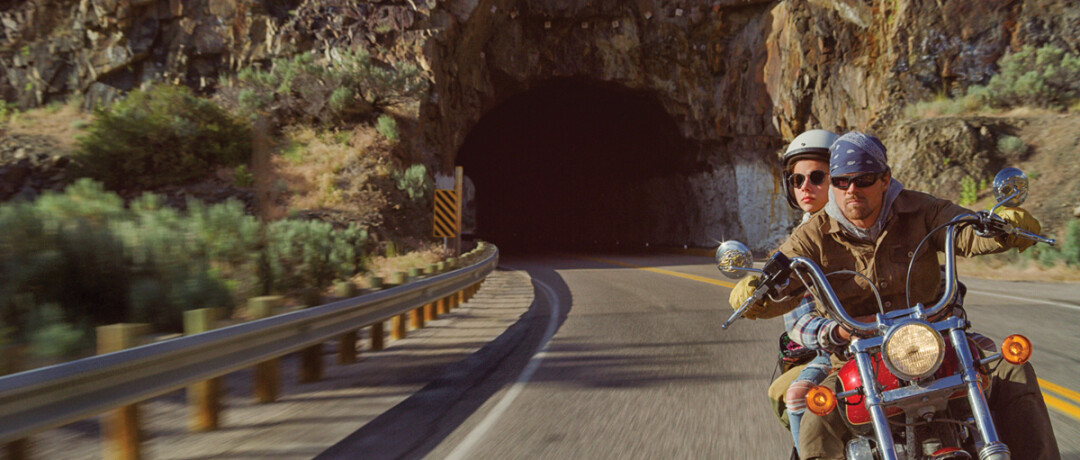Two Yellow Lines Debuts at BZN 2020
Cynthia Logan | Saturday Aug. 1st, 2020

Actor / Producer Zac Titus’ Two Yellow Lines is one of the highlighted films set to screen at the Third Annual BZN International Film Festival, which will be held both as a live event in Bozeman August 27-30 and online August 27 – September 5. Filmed in Montana, this father-daughter ‘road trip movie’ features riveting emotional content and stunning vistas, many seen from the perspective of a ‘98 Wide Glide Harley.
Titus grew up on a small farm in central Ohio, where his love for adventure led him deep into the woods at a young age, which may be why he set Jack Elliot, a former smokejumper suffering from PTSD after a runaway backcountry fire, on a steep mountain slope high in the Montana wilderness. It may also have to do with the fact that just eight days after having moved to Montana, Titus lost his sister, Alicia, a Flight Attendant on United flight 175, on 9-11. He knows first-hand the healing power of our unique landscape.
Both Zac and his wife, Lana, attended Carroll College (Zac was a kicker on the first two Fighting Saints National Championship Football teams) and the couple ran a Bed & Breakfast for five years in Helena before moving to L.A. for him to pursue acting. Titus had a lead role in Killer Contractor on Lifetime and appeared in a popular Superbowl commercial this year. His most recent credit is a recurring role as Charles Bernitz on Apple TV/Sony’s series For All Mankind.
Bozeman Magazine affiliate Cynthia Logan sat down with Zac (wearing his trademark scruffy mustache/ goatee combo, a cap and a bandana) and his daughter Alexis (Lexie) ahead of the premiere of this exceptional indie film.
Bozeman Magazine: Where did you get the idea for this film?
Zac Titus: The true inspiration came from a motorcycle road trip that Lexie and my father-in-law took to Ohio. And I was yearning to dig deep and see what I needed to look into. My sister’s passing in 9-11 was devastating; I used the mountains as a healing mechanism. The people here are warm and caring. I thought it would be good to look at my inner demons and pass them through Jack for this film. That lit a spark and off we went.
BM: Where in Montana was the film shot?
ZT: It was based around Helena, and we had a twenty-two day shoot in Yellowstone and Thompson Falls and roads in between, including McDonald Pass. The Sanders County sheriff opened his arms and invited us in, embraced us. [Montana Film Commissioner]Alison Whitmore was a massive help. I know Montana pretty well; I’ve ridden a lot, but she knew these back roads that would accommodate this story. She was a great asset and helped us get a film grant. We couldn’t have done it without the people of Montana. We had the location for free because they believed in and trusted us. My Montana roots are quite deep; most of my intimate relationships are here.
BM: How did you decide to cast your own daughter as Hannah, your daughter in the film?
ZT: When I first pitched her to the director and my co-producers, they weren’t sure. I put her in the first film I produced when she was four, and she’s been on stage. I took them to see West Side Story, where she was performing. They looked at me toward the end and said, ‘Yeah, this is our girl.’
BM: Lexie, how was it for you working with your dad?
Lexie Titus: I’d never seen my dad cry and show the emotions he shows in the movie. I’d be behind the camera thinking, ‘Don’t cry… don’t cry!’ It was a lot easier for me to portray his daughter because I am his daughter, but it was harder to play a daughter with so much anger toward her dad. At times I had to work really hard to get the emotions I needed. The second day there was a scene where I had to cry. We started talking about the story and then I couldn’t stop crying, even in scenes where I wasn’t supposed to. It was big for me, intense.
BM: Has your relationship shifted after doing this movie? If so, how?
LT: Filming brought me and everyone we filmed with closer. I was close with my dad, but two summers in Montana on the road with nothing to do but talk and bond brought us even closer.
BM: When we first meet Jack, he seems harsh, introverted and somewhat unattractive; was that intentional?
ZT: Yes, that was a conscious decision. In the beginning, he’s hiding behind his beard and toughness and that doesn’t make you attractive. When he becomes vulnerable, he opens to his true self and releases the shield, and that is very attractive.
BM: Kind of like after a couple of drinks?
ZT: After a couple of beers, it’s that you relax and then true beauty shines.
LT: The more comfortable you get the more attractive you become.
BM: Zac, can you talk about the emotional transformation Jack goes through in communicating with Hannah?
ZT: I have four daughters, so empowering young women is what I’m all about. I was blessed with beautiful parents and so was my wife. Not everyone is; I grew up with lot of friends with a single mom, or a dad who was not very nice. Being vulnerable is part of parenting. You can be as tough as needed, but you can open up and build a relationship that’s gonna last forever. Jack wouldn’t have been able to do it had Hannah not empowered herself to face the trauma she went through as well. PTSD is not just a war vet. It could be a first responder, an accident. You might not realize that event was so traumatic to others, but watch out for signs of depression and anxiety in situations where it’s not really threatening.
LT: It’s not only about dads understanding, but daughters understanding what daughters are going through. I had to ask why he left, then why he abandoned her on the road. Hannah gave me the voice to ask those questions, and that voice gave me confidence. I think that [aspect of the film] could be helpful for young people.
BM: One of the main characters in the film is a Harley Davidson…
ZT: Yeah, it’s very key. I got it three months before the shoot and bonded with the Harley. It offers a great sense of freedom, like the old cowboys of the west. On the open road from a motorcycle, you see and smell things differently. Our designer chose a particular Harley and a wardrobe with a special color scheme that fit into the land.
BM: There are some great thematic explorations about controversial issues in this film.
ZT: Right. One example is connecting the environment and loggers—let’s find where we agree. Jack’s new job felling trees killed by pine beetles is very important; a healthy forest produces fires that can help the environment; we were adamant about portraying this.
BM: Two Yellow Lines flows seamlessly; did you film the scenes sequentially?
ZT: We did film sequentially. It helped Lexie to experience it as the story moves forward. When Hannah is angry, Lexie could hold that a couple of days; the same with feelings of angst, acceptance and love. On reshoots, we would spot check little scenes. We camped; we would work through the daylight—that’s late here in Montana—to get a sunset shot. That was a test for her; being a teenager forced to work until nine at night and be up for a sunrise shoot.
BM: You didn’t have to do much set dressing either!
ZT: I’m a rather simple guy, and so is Derek Bauer, my co-writer. We’re backcountry skiers and snowboarders and winter camp. We don’t need extravagant things. We, along with producers Billy Zeb Smith and Jake Olson, were an intimate team. I knew these guys were gonna be there for the 18-hour days. We had a great shorthand and knew we had each other’s backs. All but one of us have daughters.
BM: Did you do your own stunt work?
ZT: l do all my own stunt work and motorcycle riding. I’ve done it in my commercials. I pride myself on that.
BM: There is some great tension in the fight scene. Did you choreograph that?
ZT: Yeah, I choreographed the fight scene. My brother Eli played Denny, the guy who punches me. My dad taught us to box. On the seventh take, we make eye contact—I had taken a step forward and when I began to look, Eli followed through. As an actor I wasn’t upset; it left some swollen welts. We used that take in the scene where I go down. My brother’s reaction was priceless… I guess me messing with him as an older brother… he broke his knuckle, a boxer’s fracture. He’s as tough as they come, but it scared me a little.
BM: Lexie, is there more acting on the horizon?
LT: I want to act again, but for now I want to enjoy my childhood. I just got my first car! It’s a ‘73 Ford Bronco with a soft top. I’ve got some work to do on it, and I have to relearn the stick shift, so it could be a long process.
BM: Zac, how has it been for you during the Pandemic?
ZT: Three girls, online schooling and a two-year old! My wife has been a rock star. She’s very much a powerhouse. As filmmakers, we thought ‘what do we do now?’ Producing and acting in this film was our baby. We put our heart and soul into it. You jump in and hope… this is the kind of analog story we need right now. A silver lining of the pandemic is building a virtual experience, so we’re grateful that this Festival will be online as well as in person.
BM: Lexie, is it true you haven’t seen the finished film yet?
LT: I’ve been waiting until there’s a premiere on a big screen. I’m kind of nervous!
ZT: It will be nice to come here (to the BZN International Film Festival) and allow her to see it with friends, family from Helena, and the crew.
Two Yellow Lines will screen Friday, August 28 in the Emerson Center’s Crawford Theater. ‘Masketeers’ will escort attendees to their seats. For information on the schedule, passes and safety protocols, please visit bzn2020.com.
| Tweet |
